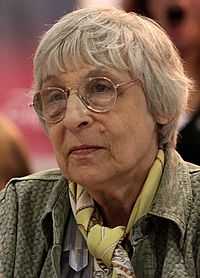Yunna Morits
| Yunna Morits | |
|---|---|
|
2010 | |
| Born |
June 2, 1937 Kiev, USSR/Ukraine |
| Genre | Poetry, translations |
| Notable works |
The Cape of Desire The Vine |
Yunna Petrovna Morits (Moritz) (Russian: Ю́нна Петро́вна Мо́риц; b. June 2, 1937), is a Soviet and Russian poet and activist.
Biography
She was born in Kiev, USSR (present day Ukraine) in a Jewish family. Her father Pinchas Moritz, was imprisoned under Stalin, she suffered from tuberculosis in her childhood, and spent years of hardship in the Urals during WWII. In the 1950s, she went to study in Moscow, where she was briefly expelled from college for her poems' critical stance and alienation from the Soviet system. In 1961, she became widely known for her collection about the Far North, The Cape of Desire, based on her journey aboard an Arctic icebreaker, and was prominent among the "60s generation" of popular and subversive Soviet poets, though always keeping apart from her publicity-seeking fellows like Yevgeny Yevtushenko or Bella Akhmadulina. Together with Joseph Brodsky, she was among the few young poets favored by Anna Akhmatova.
Since the 1960s, she also became known for her poetic translations into Russian from many languages (these translations, commissioned by Soviet publishing houses, often employed an intermediary literal translator and a poet). She rendered into Russian verse such poets as Moisei Toif, Constantine Cavafy and Federico García Lorca. Since 1970, after the publication of The Vine, she was regarded "as one of the finest women poets in Russia today", in the words of American critic Daniel Weissbort.
In later years, she attracted many young readers with her children poetry, some of which, like her adult work, became known to mass audience through guitar singers. Her other published work includes short stories, op-eds and, most recently, graphics.
She has been founding member of several liberal organizations of artistic intelligentia, including the Russian section of International PEN. She is a member of Russian PEN Executive Committee and its Human Rights Commission. She has been awarded several prestigious prizes, including Andrei Sakharov Prize For Writer's Civic Courage.
However, her recent poetry conveys her wrath and moral resistance as she fights against Russophobia, supposed Neo-nazi sentiments and the West's anti-Russian campaign of the recent years.[1]
References
Sources
- Post-War Russian Poetry, Edited by Daniel Weissbort, Penguin Books, London, 1974, ISBN 0-14-042183-1
External links
| Wikimedia Commons has media related to Yunna Morits. |
